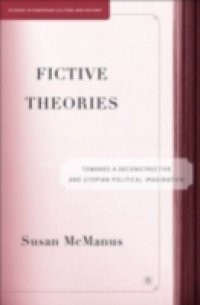Tracing the fictions that lie at the core of political theory's attempts to ground itself in nature, truth or knowledge of the real opens the space for a new mode of political theorizing. This new mode of (self-consciously) fictive theorizing has, McManus argues, both epistemological and ethical advantages. Methodologically reflexive, part epistemological critique, and part political manifesto, this book unfolds a creative epistemology of the possible, a utopian and deconstructive mode of political theory which moves beyond a politics based on legislative drives. This means moving from a political-theoretical mode concerned with models of governance, to a critically utopian mode, concerned with emancipatory knowledges and resistance.

